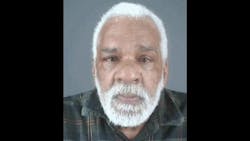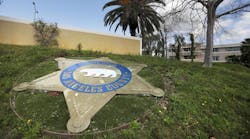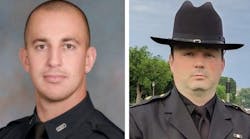ALBANY, New York -- An ex-Black Panther suspected of the ambush murders of two New York City police officers in 1972 was sentenced to 21 years in prison Thursday for repeatedly selling heroin to an undercover police officer in the Capital Region.
Law enforcement officials — including New York City Patrolmen's Benevolent Association President Patrick Lynch and Andrew Vale, the local head of the FBI — packed a third-floor courtroom in Albany County Court to watch justice imposed by Judge Peter Lynch on 65-year-old Robert Vickers.
The defendant reinvented himself as a Saratoga County public works employee despite a past that included him being sentenced to 8 to 10 years in prison for weapons possession and assault in 1973 in a case tied to the shooting of a Newark, N.J., police officer.
Vickers, also known as Rashad Abdur-Rahman, has long been suspected in Jan. 27, 1972, murders of NYPD officers Rocco Laurie and Gregory Foster in Manhattan. The radical Black Liberation Army group claimed responsibility for the officers' murders in the days after Laurie, 23, a white officer from Staten Island, and Foster, 22, a black officer from the Bronx, were ambushed while on foot patrol in the East Village.
The judge made it clear that he was not sentencing Vickers based on uncharged crimes, but said he would consider all the evidence that came out at the drug trial. That evidence included testimony that a duffel bag found across the street from the scene of the officers' murders in 1972 contained a bomb-making manual that belonged to Vickers.
The judge noted evidence in the drug case also showed Vickers "describing how best to assassinate individuals, the best weapons to use and his plan to assassinate another individual for the purposes of, I think it was three kilos of heroin."
Assistant District Attorney Jasper Mills told the judge that Vickers touted an ability to "make bombs and silencers" and said the "perfect assassination weapon" was a .22 caliber gun, which he sold to an informant in the case.
"It's easy to kill someone," Vickers said on a surveillance video, according to Mills. "The hard part is getting away with it."
The prosecutor said Vickers exhibited a chilling support for violence and the destruction caused by heroin. Vickers was so callous in his heroin dealing, Mills said, that he was caught on video offering a chilling tutorial on how to maximize sales.
"You want word to spread that people are overdosing and dying while using your product. That will drive addicts to you and increase sales," Vickers said on the video.
Vickers was convicted at trial of selling heroin to an undercover police officer six times between Sept. 20, 2013, and Jan. 6, 2014, at locations in Albany and Menands.
Vickers' attorney, longtime Albany lawyer Michael Feit , argued at trial — and in court Thursday — that Vickers fell victim to entrapment because he is a suspect in the officers murders.
An emotional Feit continuously clashed with the judge, his former colleague in the Albany County public defender's office, while arguing on behalf of Vickers, who Feit referred to at one point as "this poor guy." Feit suggested to the judge that he was well aware of Vickers' history when Vickers was tried and convicted of other heroin sales in 2014.
The judge quickly told Feit that he was aware during that last trial of allegations that Vickers killed the officers, but the latest trial revealed "significant additional testimony and evidence" about Vickers' activities from the late 1960s to the present.
Still, Lynch said: "The sentence that I'm going to impose today will not correspond to the shooting deaths of Officers Foster and Laurie because he's not been charged with that ... let's not mix apples and oranges here. The testimony at the first trial did not fully disclose the life and character of Mr. Vickers whereas testimony at this trial has."
Vickers, sitting in a wheelchair, told the judge he is a drug addict but did not kill the officers and did not sell drugs.
"This trial is not about drugs .. it was all mythology," he said. "This is all manufactured by this New York City police department and Albany Police Department."
Patrick Lynch, the PBA president told the Times Union after the sentencing: "It goes to show that (Vickers) entire life was a waste. His entire life was about criminal activity. He participated in the killing of New York City police officers in 1972, then he comes up here and he stayed and he peddled his drugs, his poison, to folks right here in Saratoga and Albany counties. It's good to see he's going away for 21 years. He'll be behind bars where he won't hurt anybody."
Copyright 2016 the Times Union (Albany, N.Y.)Tribune News Service



